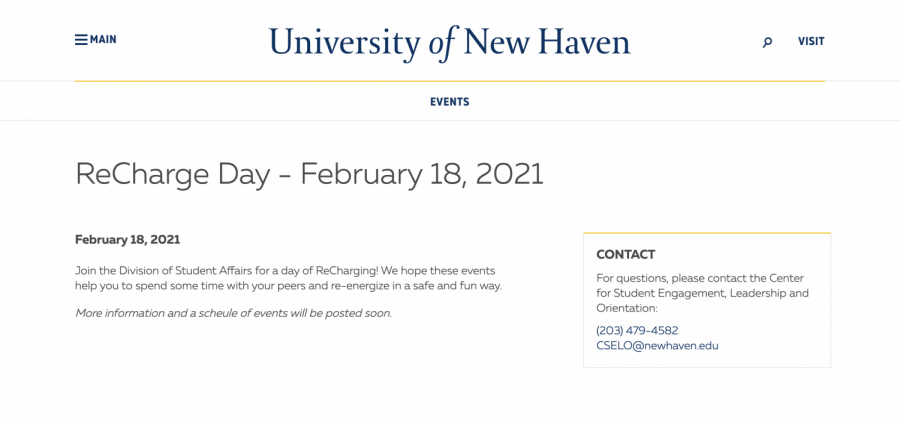Goodbye spring break, hello ReCharge days
Photo courtesy of the University of New Haven website
Screenshot of the ReCharge Day webpage on newhaven.edu
Before the spring 2021 term began, the University of New Haven made the decision to cancel spring break to prevent students from traveling and possibly returning to campus with a COVID-19 exposure. The university instead implemented four ReCharge days throughout the semester, which are days where students will not have classes.
The ReCharge days are scheduled for Feb. 18, March 9, March 31, and April 19. However, not all students get to enjoy these days off. On the 2021 academic calendar, there are links to classes that are excluded from re-charge days. On Feb. 18 and April 19, over 50 classes are still required to meet.
“For those who have labs that day, tell yourself that two and a half hour lab is going to be the only thing you do that day, and then after you’re going to take your ReCharge day,” said Helena Cole, director of the Center for Student Success (CSS).
Cole said that the decision to implement re-charge days rather than spring break, “was made for health and safety reasons, rather than academic ones, [so] I don’t think it make[s] sense to compare the two option from an academic perspective.”
Senior criminal justice major Gabby Morris feels that the re-charge days are an unfair substitute, as some students are not given the break they are supposed to.
“Last time they did recharge days professors still had homework assigned and due for that day even though we weren’t supposed to,” said Morris. “So there isn’t a point in having the days off if there is work to be done anyway.”
Morris was not the only student to claim that four ReCharge days is not enough. Not only are students not getting a consecutive break, but spring break typically ran Sunday to Sunday, meaning they are getting half of the break they used to.
“I’d rather have recharge days than nothing but a few days off in a row is a necessary break for everyone,” said Matt Ryan, a junior engineering major.
Instagram user @dcat_820 said, “They’re not an actual replacement. I would rather have a full week off.”
“I don’t think it was a good decision because the students’ mental health is going to suffer,” said junior criminal justice major Rachael Fortier. “I feel that people are gonna be more likely to skip classes when spring break would be so that they can have a break.”
Cole told The Charger Bulletin that she understands if students are upset about the spring break cancellation as many students look at the long break as a time to have fun or rejuvenate, more so than during fall break. However, the university is following CDC guidelines and recommendations, and that giving students the opportunity to possibly travel during spring break would have been irresponsible.
“For students, I say look at your syllabi, look at your schedule. Figure out what you need to do, and schedule your fun,” she said. “I know it is hard because you can not go anywhere or see anyone, but think of your pod. Maybe have a Netflix watch party. There is still a lot that you can do online.”
As for those who may be concerned about how not having a spring break may impact their mental health, Cole said that students should take advantage of COVID-19 hotlines and faculty as everyone is going through this together.
“Use your resources, we have many at the university,” said Cole. “If students are stressed they can come to our office and work with us on stress management, and if we feel that the issue is bigger we can refer them.”

Beth Beaudry is a senior majoring in communication with a double concentration in journalism and public relations, and a minor in English. This is her...











